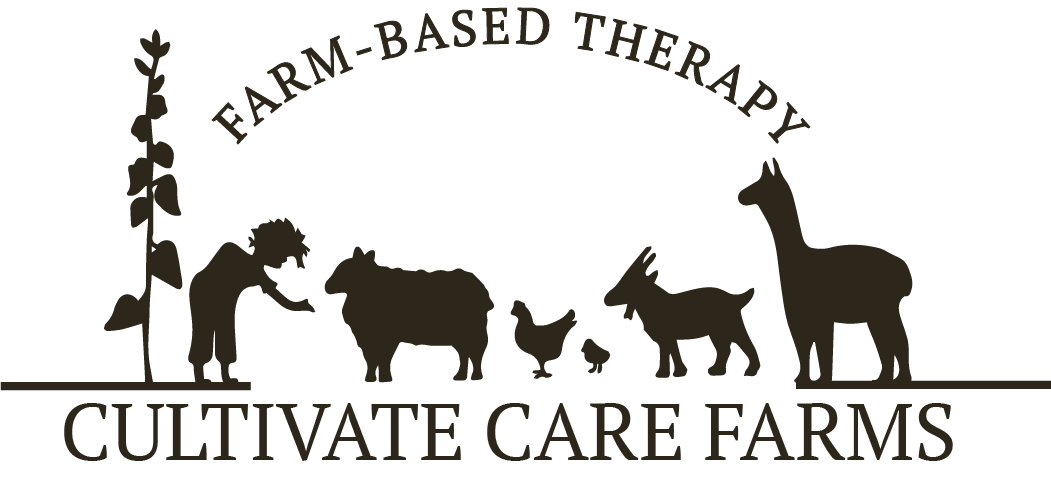What Is
Farm-Based Therapy?
Farm-Based Therapy™
Posts and Beams
The Farm-Based Therapy (FBT) modality consists of five core components, which we refer to as Posts. Like the strong and sturdy posts in a barn, FBT Posts are the backbone of this approach. Each Post supports multiple Beams, or the tangible benefits of FBT. Together, these Posts and Beams form a cohesive structure that transcends its individual parts, creating a holistic space where healing, community, and personal growth thrive.
Post One: Hands-On Experience
Direct, experiential activities with the animals and the Farm
At Cultivate Care Farms, therapy isn't just about talking; it's about doing. Through hands-on experience caring for animals, building enrichment toys, or maintaining the Farm, clients develop practical skills, confidence, and a sense of purpose. These activities foster empowerment, compassion, and problem-solving abilities, helping individuals care for themselves as they care for the Farm.
Beams
Experience a sense of empowerment and impact
Build mastery, confidence, and resilience
Deepen compassion and empathy for another’s experience
Increase resourcefulness and problem-solving skills
Post Two: Sustainability
Engaging in activities that support the Farm
Farm-Based Therapy integrates sustainability into every aspect of our Farm life. From harvesting food for our animals to crafting wool-based items, clients engage in a cycle of care that connects mind, body, and the environment. This focus on sustainability teaches patience, goal-setting, and the importance of small actions in creating long-term change—both on the Farm and in clients' lives.
Beams
Increase comprehension of connection between people, animals, and plants
Witness change and growth; observing processes over time
Participate in consistent work in order to achieve goals
Develop patience to allow time for small actions to have larger impact
Post Three: Life Cycle
Participation in Farm-based activities across the life span of the animals and plants
The Farm is a place where the cycles of life are experienced firsthand. Clients witness births, care for young animals, and provide end-of-life care, developing empathy and responsibility. These experiences help clients process emotions related to life changes and grief, both on the Farm and in their personal lives.
Beams
Deepen understanding being able to care for and support other people and living beings
Experience and process grief in a supportive environment, and learn how to manage emotions associated with grief
Relate experiences on the farm to those in their personal lives, such as anticipation of or the experience of observing birth, illness, or death in their own lives
Post Four: Community
Community service activities that support a sense of belonging
Community is at the heart of Farm-Based Therapy. Clients work together on tasks, share experiences, and participate in local events, fostering a sense of belonging. By helping others, clients build connections, grow their support networks, and strengthen their emotional resilience.
Beams
Gain experience/confidence in building connections with others
Develop a sense of belonging as a part of something larger than one’s self
Find one’s Herd, or chosen family
Experience the healing nature of helping others
Post Five: Mindfulness
Present, non-judgemental focus on engaging in farm-based activities
Every task on the Farm requires mindfulness, whether it's balancing a wheelbarrow or reading an animal's cues. These activities ground clients in the present moment, providing relief from worries about the past or future. By practicing mindfulness, clients learn to regulate emotions, focus on their well-being, and connect deeply with the natural world.
Beams
Focus on the present and take space from past and future worries
Practice checking in with your body as a way to regulate overwhelming emotions
Observe the natural world and take a break from unnatural stimulation
Why Is Farm-Based Therapy So Powerful?
Farm-Based Therapy is more than a unique approach to mental health care—it’s an evidence-based approach for clients who may have difficulty engaging in a more formal therapeutic setting. By moving therapy out of an office and into the open, natural environment of the Farm, FBT creates an inherently social and non-threatening space for healing. Therapy sessions can take place anywhere on the Farm, whether it’s tending to animals, harvesting vegetables, or simply walking the trails. This allows for a less formal, more interactive therapeutic experience, helping clients feel more at ease as they work through emotional challenges.
One of the most transformative aspects of FBT is its ability to destigmatize mental health care. Even during individual therapy sessions, clients are surrounded by the rhythms of farm life and the presence of others engaged in similar activities. This communal environment helps clients see that they are not alone in their journey toward emotional well-being, breaking down the isolation often associated with mental health struggles. The Farm becomes a living reminder that mental wellness is a shared experience, where individuals can support each other, even if simply by being present in the same space.
We use the FBT modality in the treatment of clients with anxiety disorders, adjustment disorders, attention-deficit/hyperactivity disorder, depression, autism spectrum disorder, and post-traumatic stress disorder, and FBT provides a valuable therapeutic alternative for those who have not benefited from other therapy models. By incorporating purposeful activities, hands-on engagement, and a connection to nature and natural processes, Farm-Based Therapy empowers clients to heal, build resilience, and experience growth in a setting that is supportive, inclusive, and deeply connected to the world around them.






